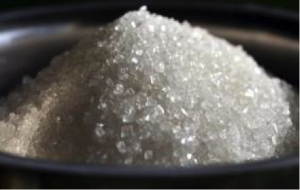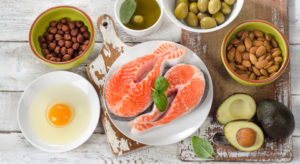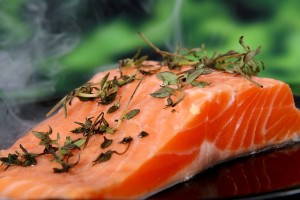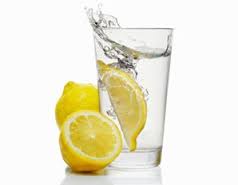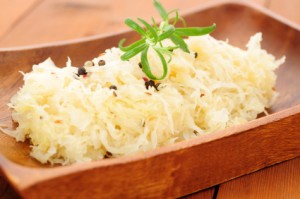Healthy Eating Tips
Healthy Eating Tips
Like you I am on a constant journey to find the foods, thoughts, and feelings that allow me to thrive. I use my kitchen to the make foods that nourish my body, mind, and spirit. I invite you to do the same. Here are some of the basic food and lifestyle tips that will support your body to feel peace and harmony from the inside. It is my intention to bring you deeper into your own connection with your body, your food, and your inner HAPPINESS.
There is a lot of conflicting diet information out there and it certainly can be confusing. There is no one size fits all diet. We have different bodies, ages, ethnicities, and backgrounds. To cut through the confusion, I have put together eating guidelines that most enlightened health experts pretty much agree on.
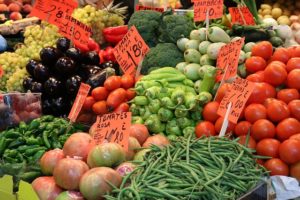 Eat Mostly Vegetables
Eat Mostly Vegetables
Vegetables are full of the vitamins, minerals, and fiber your body needs to function optimally. They are alkaline and easy to digest. If you have a plate in front of you 70% of that plate should consist of vegetables, the remaining 30% protein and carbohydrates.
Eat mostly green vegetables and also include vegetables with a rainbow of colors (orange, yellow, red, purple). Each color has unique antioxidants and phytochemicals to scavenge free radicals and keep you healthy.
Keep Blood Sugar Stable
Blood sugar issues are linked to most of the chronic and inflammatory diseases we see affecting adults today. Blood sugar issues are the underlying cause of cardiovascular disease, the number one cause of death in America.
Excess sugar is not so sweet for your digestive system and causes inflammation.
Sugar feeds the bad bacteria and Candida (yeast) in your gut, which results in bloating, gas, and other unpleasant digestive problems.
How do you keep your blood sugar stable?
- Instead of white sugar switch to raw honey, coconut sugar or organic maple syrup. Use stevia in combination with these sweeteners to keep your glycemic levels down.
- Carbohydrates, even healthy ones, spike your blood sugar. Eat mostly low glycemic carbs. Get your carbohydrates primarily from starchy vegetables, low glycemic fruits like berries, apples and pears. Choose seed grains which are low glycemic; quinoa, millet, buckwheat, amaranth.
- When you eat sweets, pasta, breads and grains, add a plant-based fat; ghee, coconut oil, olive oil, nuts and seeds to your meal. It helps lower the dangerous after-meal blood sugar spike and free radical oxidation.
Click here for my guide to kick sugar cravings.
 Eat Whole Foods
Eat Whole Foods
Eat whole foods from the earth in their natural state with a minimum amount of processing and no chemicals. Whole foods include vegetables, fruits, grains, beans, naturally raised animal products and wild fish.
Limit your exposure to toxins. Chemicals, pesticides, antibiotics, vaccines, hormones, preservatives, additives and artificial sweeteners are toxic to your body and cause it to work extra hard. When your organs are working hard removing toxins they don’t have the energy for rebuilding. Your organs don’t work optimally and you wind up feeling tired and achy.
Eat Healthy Fats
For years we were told to avoid fats. These are some of the fat myths we used to believe: Fat makes us fat, fat contributes to heart disease, and fat leads to obesity, saturated fat is bad, while vegetable oils are good. These are all untrue and the new research on the importance of fat is catching on.
Good fats can speed up your metabolism, make your brain work better and faster, balance your hormones and create that inner glow. The key is eating the right fats.
Choose from these high-quality fat sources at every meal:
- cold pressed coconut oil
- coconut butter
- extra virgin olive oil
- flax, chia or hemp seeds
- grass fed organic butter
- nuts and seeds
- expeller pressed avocado oil
- ghee
- MCT oil
- flaxseed oil
- expeller pressed hemp oil, walnut oil, pumpkin seed oil
Avoid vegetable oils: safflower, soybean, sunflower, corn, canola and cottonseed oils; hydrogenated or partially hydrogenated oils; margarine and shortening. Vegetable oils contain a very high concentration of Omega 6 fatty acids and polyunsaturated fats, which cause an imbalance in the body. Omega 6 fats are easily oxidized with heat or light exposure. Most vegetable oils are full of chemicals and cause inflammation when consumed. Read my blog 4 Reasons To Stop Using Vegetable Oil
Eat Sufficient Protein 
Protein helps you maintain your natural body weight, and lose weight naturally. It also works to stabilize your blood sugar levels, improve your ability to learn and concentrate, reduce brain fog, boost your energy levels, support your muscles and bones and support the absorption of important nutrients.
The right amount of protein varies depending on your weight, age, gender, health issues (adrenal fatigue, blood sugar issues) and amount of exercise. Start your day with protein instead of carbohydrates. 15 Breakfasts to Balance Hormones Boost Metabolism and Reduce Cravings
Quality is key, whether you’re eating animal or plant protein. Animal protein should be from animals without antibiotics and hormones that are treated humanely. As for vegetarian proteins, based on everything I know I recommend avoiding protein from unfermented soy and seitan.
Here are the high-quality protein sources to choose from:
- Wild seafood (sardines, wild salmon, etc)
- Pastured poultry
- Pastured eggs
- Hemp or rice or non-denatured grass-fed whey protein
- Grass-fed beef and lamb
- Tempeh (only fermented soy products)
- Beans, lentils
- Nuts, seeds
- Hemp, flax, and chia
- Quinoa
Eat Local Seasonal Food
Fresh produce has the best taste; crispy, juicy, fragrant and colorful since it is allowed to ripen in the sun. Local vegetables carry the most amount of nutrients. Seasonal produce can be grown without pesticides and chemical fertilizers.
Building a lifestyle around seasonal food facilitates the body’s natural healing process. Our body has different needs throughout the year. Our microbiome changes seasonally and local produce supports the exact microbes needed to keep us healthy each season.
Apples grow in the fall and they are the perfect transition food helping the body get rid of excess heat and cool down before winter. In the spring the abundance of leafy greens helps us alkalize, detox and lose some extra pounds after a long winter of heavier foods. In the summer we need to cool down and stay hydrated by eating more fruits, berries, cucumber, watermelon etc.
Stay Hydrated
Many people are chronically dehydrated. Sometimes you think you’re hungry but you’re really thirsty. When you’re dehydrated your brain, which is 90% water, doesn’t function optimally. Adequate water intake improves the digestive processes in all stages, from mouth to stomach to intestines and helps you avoid constipation. In fact, your body cannot digest food without adequate water.
What does water do for you?
- Dissolves nutrients so they are absorbed in the digestive tract.
- Carries chemicals and nutrients to cells and tissues.
- Removes waste from the cells to kidneys and skin for elimination.
- Increases metabolism.
What is enough water and how do you get it?
- Aim to drink half your ideal weight in ounces of water each day.
- Start your day with 16-24 ounces of water as soon as you wake up, before food to replenish water lost while sleeping. This gets the pipes moving and the kidneys flushed.
- Drink water every 2 hours during the day to stay hydrated. You are losing water all day long through urination, sweating and breathing.
- Drink 8-16 ounces of water 30-60 minutes before each meal to turn on your digestion, help flush out the toxins and increase nutrient absorption.
Herbal teas are a great way to increase your intake of water. Ginger, fennel and fenugreek teas are known to support digestion. Add a few slices of cucumber and mint for a refreshing drink.
 Eat Fermented Vegetables & Cultured Foods
Eat Fermented Vegetables & Cultured Foods
Fermented foods populate your gut with “good bacteria” naturally. The good bacteria digest your food, produce B vitamins and prevent the bad bacteria from taking up residence.
Include at least 2 tablespoons of sauerkraut or kimchi with lunch and dinner. Be sure you get raw sauerkraut in the refrigerated section. Don’t get the sauerkraut from the supermarket shelf. They have been heated and all the good bacteria killed. Kombucha and kefir are good once in a while too. The reason I don’t recommend eating them regularly is that of their high sugar content can spike your blood sugar levels. When you start eating fermented foods begin slowly to give your microbiome a chance to get adjusted to the new bacteria coming in.
Eat These Foods in Moderation
Included in these healthy eating tips consider eating dairy, gluten, coffee, and alcohol in moderation. This doesn’t mean you can’t eat these foods but limiting them is better for your health. I don’t like to say never. It feels so restrictive and makes us rebel. Less is better than never.
Gluten is a hard to digest protein. The wheat grown by our ancestors has evolved into a very different species in modern times. Today’s wheat has a much higher starch content and more gluten proteins than 100 years ago making it more likely to cause inflammation. In addition the pesticides and antibiotics we have been exposed to weaken our digestive system making gluten more difficult for us to break down. When eating bread look for ones that use organic sprouted flour made with sourdough.
Dairy contains casein another protein many people have trouble digesting. Dairy also raises your blood sugar since lactose is a sugar. I recommend eating only whole milk products, grass-fed and raw if possible. The natural fat allows the lactose to be absorbed more slowly into your body, not raising your blood sugar too high or too fast. Milk products from grass-fed cows contain more beta-carotene and omega-3 fatty acids than factory farmed animals. It’s also high in conjugated linoleic acid (CLA), a healthy omega-6 that’s been shown to lessen symptoms of inflammatory disorders such as allergies and asthma. Choose raw cheeses which contain natural enzymes which help your body break it down. NEVER EAT LOW FAT OR PROCESSED MILK PRODUCTS.
The Way I Eat
Lots of people ask me how I approach my diet. At this point in time, I eat a paleo or ancestral diet, without gluten and a minimum amount of dairy, coffee and wine. I follow all of my healthy eating tips. I also limit my beans and grains. I eat animal protein but in small quantities. I eat this way because I am in a healing phase. I eat a ‘perfect’ diet 5 days a week and 2 days a week I enjoy 2 or 3 pleasure foods to satisfy my inner child.
It is my intention to heal and be able to eat anything I want without any negative side effects. This is freedom to me. I want to be healthy enough to go to Italy and enjoy pasta, go to France and enjoy croissants, go to Asia and eat dhal and rice.
That said, I love eating a paleo diet as it makes me feel really good and has many health benefits. I think beans and grains are part of a healthy diet if you can digest them. I aim to eat 7-9 cups of vegetables each day. I will do this for the rest of my life. As my body changes so will my diet but I will always eat lots of vegetables and follow my healthy eating tips.
If you would you like to join our community of heart-centered individuals, creating an energy of joy, well-being, and appreciation in the world CLICK TO SIGN UP for my weekly email newsletter of recipes and tips for you to eat well, stay healthy and enjoy your wonderful life.

